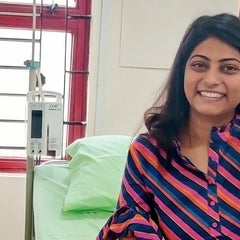Amidst the pandemic, an Indian army man donated his blood stem cells to save a blood cancer patient
A blood stem cell transplant is often the only treatment option for patients suffering from blood cancer and other blood disorders like Thalassemia and Aplastic Anemia.
A blood stem cell transplant is often the only treatment option for patients suffering from blood cancer and other blood disorders like Thalassemia and Aplastic Anemia. Only about 30% of the patients in need of a stem cell transplant as life-saving treatment can find a sibling match. The rest 70% depend on finding a matching unrelated donor. This makes it vital for people to register as potential blood stem cell donors.
In 2019, Sandipan, a doting father, a loving husband, and passionate army personnel, registered as a blood stem cell donor with DKMS BMST Foundation India, a non-profit organization working with a mission of providing a second chance at life to blood cancer patients. He registered at a donor registration drive organized by the foundation during his military training and came up as a match for a patient in 2020.
Sandipan hails from the Latur district of Maharashtra, India. When amidst the corona pandemic everyone is concerned about their near ones, Sandipan took the blood stem cell donation as his duty. He showed his commitment and traveled from Latur to Bangalore to donate his blood stem cells.
Speaking about his experience Sandipan said, “When I received the call that I have come as a match for a patient, I was overwhelmed. Without a second thought, I agreed to donate my blood stem cells to the patient in need.” Sandipan donated his blood stem cells through the PBSC (peripheral blood stem cell) method, a process similar to blood platelet donation. Peripheral blood stem cell collection is a safe and non-surgical outpatient procedure. During the PBSC, only stem cells are extracted from the donor’s blood, blood is taken from one of the arms, passed through a machine that separates the blood stem cells and then the rest of the blood is returned through the other arm.
The global pandemic impacted the process of blood stem cell donation right from the donor registration drives to the delivery of blood stem cells to the transplant center.
Those who register online and order the registration kit at home perform the cheek swab on their own. This is easily done with the medical cotton swabs supplied and a simple instruction manual. However, while DKMS employees will then take care of the dispatch of all samples to the laboratory after an on-site registration, you are responsible for this yourself after an online registration. Unfortunately, an average of about 40 percent of the cotton swab sets are not returned after online orders. This is where initiators of online campaigns can help by not only calling for registration, but also reminding people to complete the registration process successfully by returning the set. The sooner the set is returned, the sooner the tissue characteristics can be determined and made available to all searching patients worldwide.
The Lufthansa pilot took responsibility for the stem cells which were transported in the cockpit of the plane.
Given the current pandemic, the health and well-being of the donors is the utmost priority of DKMS-BMST. When entering the collection center and before any donation, screening for the COVID-19 virus risks is carried out. These measures serve to protect the donor as well as the recipient and the employees in the collection centers. Health experts have confirmed in an important finding, that there is no evidence that the COVID-19 virus can be transmitted via blood, bone marrow, or stem cell products.
